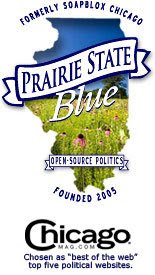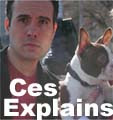The San Jose Mercury News takes a look:
The State Department has been using political litmus tests to screen private American citizens before they can be sent overseas to represent the United States, weeding out critics of the Bush administration's Iraq policy, according to department officials and internal e-mails.Maybe next time Obama should ask Richard Lugar to come along in the role of Republican chaparone.
In one recent case, a leading expert on conflict resolution who's a former senior State Department adviser was scheduled to participate in a U.S. Embassy-sponsored videoconference in Jerusalem last month, but at the last minute he was told that his participation no longer was required.
State Department officials explained the cancellation as a scheduling matter. But internal department e-mails show that officials in Washington pressed to have other scholars replace the expert, David L. Phillips, who wrote a book, "Losing Iraq," that's critical of President Bush's handling of Iraqi reconstruction.
"I was told by a senior U.S. official that the State Department was conducting a screening process on intellectuals, and those who were against the Bush administration's Iraq policy were not welcomed to participate in U.S. government-sponsored programs," Phillips said.
"The ability of the United States to promote democracy effectively abroad is curtailed when we curtail free speech at home, which is essential to a free society," he said.In another instance of apparent politicization, a request by the U.S. Embassy in Jakarta, Indonesia, to arrange a visit by Sen. Barack Obama, D-Ill., who lived in Indonesia when he was young, was delayed for seven months. The visit never occurred. ***
Current and former officials involved with the State Department's overseas speakers program said potential candidates were vetted - via Internet searches, for example - for any comments or writings that criticized White House policy.
"There's definitely a political litmus test. You don't have to be a Republican, but you better not have said anything against them," one official said.
The official said he knew of no blacklist of banned scholars. "But there certainly is a 'white list' of those who can go," he added. ***
The effort, known as the "U.S. Speakers/Specialist Program," is part of a public diplomacy effort to change negative foreign opinions of the United States. It's overseen by Undersecretary of State Karen Hughes, although the questionable practices reportedly began before she took up her post in September.
Using political views to screen candidates appears to violate the speaker program's charter, which is to present a "range of responsible opinion" in the United States to overseas audiences, not to hawk a particular administration's policies. ***
In the case of Obama, after the request from Jakarta came in Jan. 12, political appointees in the International Information Programs bureau argued in e-mails that a Republican senator should be sent as well.
That's standard State Department practice when individuals go out to discuss American party politics. But the Jakarta U.S. Embassy had asked for him to speak about diversity, not politics.
Approval for department officials to contact Obama was delayed until June 13.













No comments:
Post a Comment